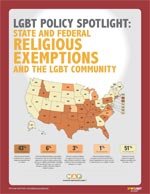New Report: Religious Exemption Laws Lead to Discrimination
Posted Sept. 1, 2015 03:32 am | Public News Service
![]() TALLAHASSEE,
FL - The impact of so-called religious freedom laws on
women and the LGBT community is the subject of a new
report from the Movement Advancement Project.
TALLAHASSEE,
FL - The impact of so-called religious freedom laws on
women and the LGBT community is the subject of a new
report from the Movement Advancement Project.
The report found the federal Religious Freedom Restoration Act - and a similar state law in Florida - allow citizens and companies to exempt themselves from laws they feel require them to violate "sincerely-held religious beliefs," unless the government can prove a compelling interest and there is no other "reasonable accommodation."
Report author Ineke Mushovic, executive director of the Movement Advancement Project, says those laws end up legalizing discrimination. She says one example is the ability of companies to deny employees contraceptives, or refuse to serve gay customers.
"There is a concerted effort by far-right activists acting out of anti-gay animus and a desire to restrict women's access to birth control," she says. "They are launching a series of lawsuits that expand the impact of these laws."
![]() Mushovic
says LGBT nondiscrimination laws would help, but Florida
has no statewide law - so 44 percent of the state's
population lives in counties where LGBT residents can
still be fired or turned away from housing or services.
Mushovic
says LGBT nondiscrimination laws would help, but Florida
has no statewide law - so 44 percent of the state's
population lives in counties where LGBT residents can
still be fired or turned away from housing or services.
Supporters of the religious exemption laws say they
are necessary to protect people of faith.
Mushovic agrees that religious freedom is an important
value, and points to a Florida case in which a prison
was required to provide Jewish inmates with kosher
meals. However, she wants to see the law modified.
"We would do a bit of a narrowing of the religious
exemption legislation," she says, "to outline that it
can't be used to harm other people or to discriminate
against them."
According to the report, 21 states across the U.S. have
religious exemption laws, and three states allow
state-licensed child welfare agencies to refuse to place
children with LGBT couples.
Photos/graphics and links added by the Observer
This piece was reprinted by the Columbia County Observer with permission or license. It may not be reproduced in any form without permission or license from the source.

